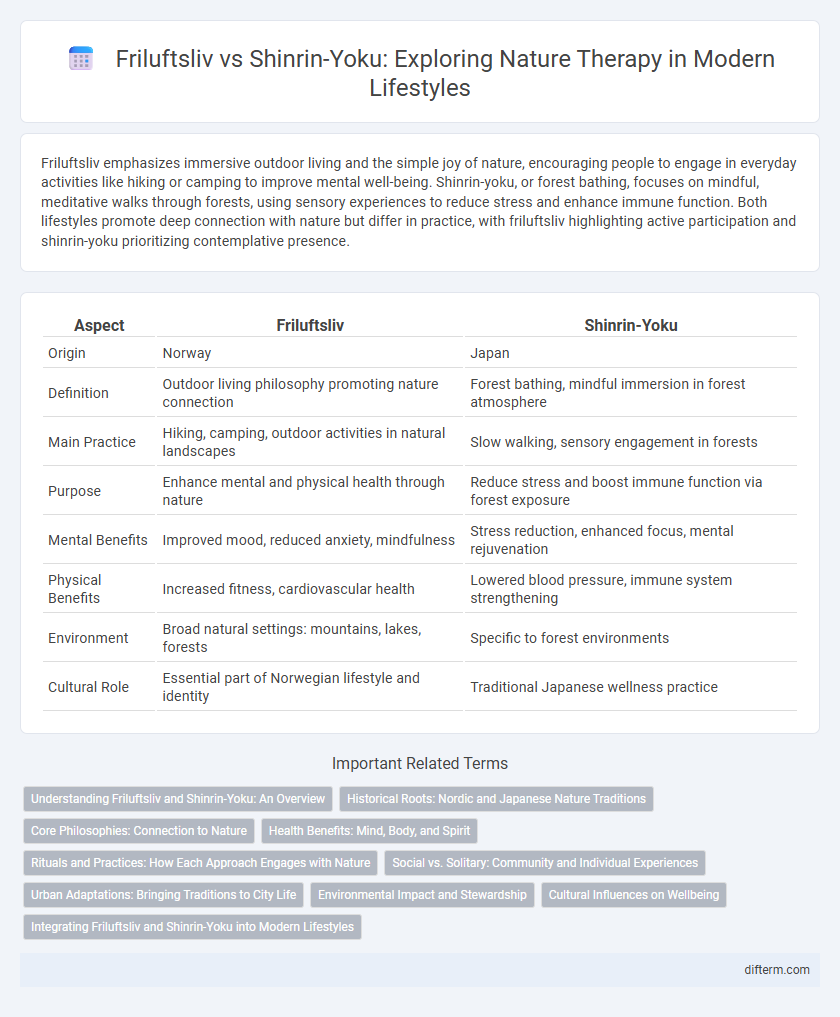Friluftsliv emphasizes immersive outdoor living and the simple joy of nature, encouraging people to engage in everyday activities like hiking or camping to improve mental well-being. Shinrin-yoku, or forest bathing, focuses on mindful, meditative walks through forests, using sensory experiences to reduce stress and enhance immune function. Both lifestyles promote deep connection with nature but differ in practice, with friluftsliv highlighting active participation and shinrin-yoku prioritizing contemplative presence.
Table of Comparison
| Aspect | Friluftsliv | Shinrin-Yoku |
|---|---|---|
| Origin | Norway | Japan |
| Definition | Outdoor living philosophy promoting nature connection | Forest bathing, mindful immersion in forest atmosphere |
| Main Practice | Hiking, camping, outdoor activities in natural landscapes | Slow walking, sensory engagement in forests |
| Purpose | Enhance mental and physical health through nature | Reduce stress and boost immune function via forest exposure |
| Mental Benefits | Improved mood, reduced anxiety, mindfulness | Stress reduction, enhanced focus, mental rejuvenation |
| Physical Benefits | Increased fitness, cardiovascular health | Lowered blood pressure, immune system strengthening |
| Environment | Broad natural settings: mountains, lakes, forests | Specific to forest environments |
| Cultural Role | Essential part of Norwegian lifestyle and identity | Traditional Japanese wellness practice |
Understanding Friluftsliv and Shinrin-Yoku: An Overview
Friluftsliv, a Scandinavian lifestyle concept, emphasizes immersive outdoor experiences to foster mental well-being and deepen nature connection through simple activities like hiking and forest bathing. Shinrin-yoku, originating from Japan, involves mindful forest bathing designed to reduce stress and enhance immune function by absorbing natural phytoncides. Both practices promote holistic health by encouraging regular interaction with natural environments, but friluftsliv emphasizes everyday outdoor living while shinrin-yoku focuses on therapeutic nature immersion.
Historical Roots: Nordic and Japanese Nature Traditions
Friluftsliv originates from Nordic countries, emphasizing open-air living and deep connection to nature through activities like hiking and outdoor solitude, rooted in 19th-century Scandinavian cultural movements. Shinrin-yoku, or forest bathing, stems from Japanese traditions dating back to the 1980s, promoting mindful immersion in forest environments to enhance mental and physical health. Both practices share historical roots in their respective cultures, valuing nature as a source of wellbeing and spiritual renewal.
Core Philosophies: Connection to Nature
Friluftsliv emphasizes an active lifestyle rooted in outdoor recreation and simplicity, fostering a deep, personal bond with nature by encouraging consistent immersion in natural environments. Shinrin-yoku, or forest bathing, centers on mindful, sensory engagement with forest atmospheres to promote mental and physical wellness through nature's therapeutic effects. Both philosophies prioritize nature connection but differ; friluftsliv advocates living harmoniously in the outdoors as a holistic way of life, while shinrin-yoku focuses on intentional, meditative presence within forests for health benefits.
Health Benefits: Mind, Body, and Spirit
Friluftsliv emphasizes outdoor living and nature immersion, improving cardiovascular health, reducing stress hormones, and enhancing mental clarity through physical activity in natural settings. Shinrin-yoku, or forest bathing, specifically promotes relaxation and immune system boosting by inhaling phytoncides released by trees, which lowers cortisol levels and elevates mood. Both practices foster a holistic connection to the environment that nurtures mind, body, and spirit, contributing to overall well-being and resilience against modern lifestyle stressors.
Rituals and Practices: How Each Approach Engages with Nature
Friluftsliv emphasizes daily outdoor activities such as hiking, fishing, and camping, fostering a continuous, active connection with nature through simple, repetitive rituals. Shinrin-yoku, or forest bathing, centers on mindful immersion in forest environments, using slow walking, controlled breathing, and sensory awareness exercises to enhance mental well-being. Both practices cultivate a deep synergy with natural surroundings but differ in tempo and intentionality, with friluftsliv advocating an active lifestyle and shinrin-yoku promoting meditative presence.
Social vs. Solitary: Community and Individual Experiences
Friluftsliv emphasizes communal outdoor activities, fostering social bonds through group hiking, camping, and shared nature experiences. Shinrin-yoku, or forest bathing, centers on solitary immersion in natural environments to promote individual mindfulness and stress relief. Both practices enhance well-being but cater to different social dynamics, with friluftsliv encouraging community connection and shinrin-yoku supporting personal reflection.
Urban Adaptations: Bringing Traditions to City Life
Friluftsliv emphasizes outdoor living and nature immersion through activities like hiking and camping, adapted in urban environments by creating accessible parks and green corridors for daily nature experiences. Shinrin-yoku, or forest bathing, focuses on mindful sensory engagement with natural surroundings, which urban adaptations implement through designed green spaces, botanical gardens, and quiet forested parks within cities to promote mental well-being. Both traditions inspire city dwellers to reconnect with nature, enhancing urban lifestyle quality by integrating natural elements and fostering environmental mindfulness.
Environmental Impact and Stewardship
Friluftsliv emphasizes a deep connection to nature through simple outdoor experiences, promoting environmental stewardship by encouraging sustainable practices and conservation efforts in Nordic landscapes. Shinrin-yoku, or forest bathing, fosters mindfulness and health benefits while advocating for forest preservation and biodiversity protection in Japanese woodlands. Both lifestyles underscore the importance of responsible interaction with natural environments to reduce ecological footprints and nurture ecosystem resilience.
Cultural Influences on Wellbeing
Friluftsliv, rooted in Scandinavian culture, emphasizes outdoor living and nature immersion as essential for mental health and social cohesion. Shinrin-yoku originates from Japan, focusing on forest bathing to reduce stress and enhance physiological well-being through sensory experiences in natural environments. Both practices underscore cultural values that integrate nature into daily life, promoting holistic health benefits shaped by regional traditions and environmental mindfulness.
Integrating Friluftsliv and Shinrin-Yoku into Modern Lifestyles
Integrating Friluftsliv, the Scandinavian practice of immersive outdoor living, with Shinrin-Yoku, the Japanese art of forest bathing, into modern lifestyles enhances mental health and physical well-being through regular nature exposure. Urban green spaces and accessible natural environments enable individuals to adopt these practices seamlessly, promoting stress reduction, improved immune function, and greater mindfulness. Emphasizing time outdoors within daily routines supports holistic wellness and reconnects people with natural rhythms essential for sustainable lifestyle habits.
friluftsliv vs shinrin-yoku Infographic

 difterm.com
difterm.com